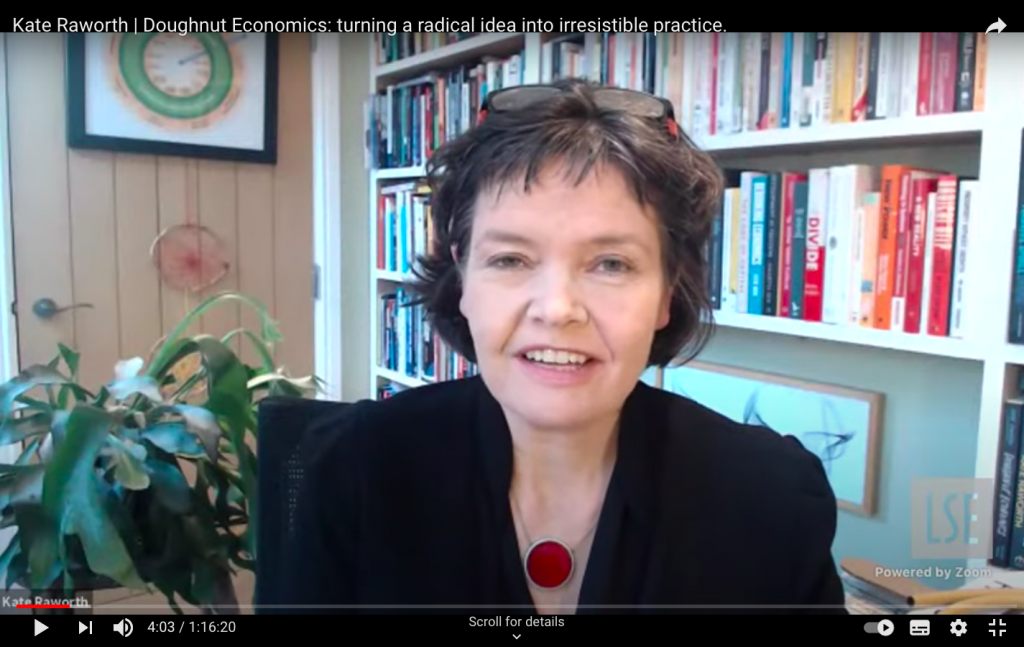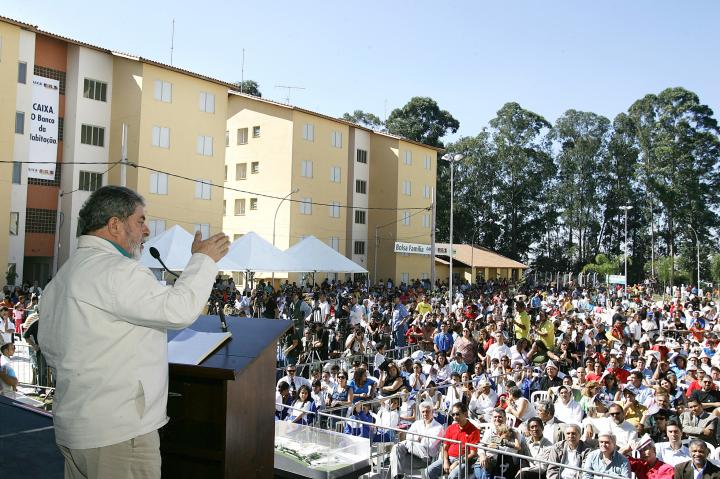On Friday 12 February Kate Raworth gave an online lecture, ‘Doughnut Economics: turning a radical idea into irresistible practice’ as part of the Cutting Edge Issues in Development Lecture series. Kate Raworth theorised the ‘Doughnut’ of social and planetary boundaries, a concept which she has put into practice through the Doughnut Economics Action Lab. She is a Senior Research Associate and lecturer at Oxford University’s Environmental Change Institute and a Professor of Practice at Amsterdam University of Applied Sciences. Read what MSc students Carolina Tenorio Llanos, Laura Hülsemann, Caterina Raimondi and Juhi Chanchalani took away from the lecture below.
You can watch the guest lecture back on YouTube.

What do doughnuts, economics and cities have in common? You might think an all-nighter studying for your LSE courses while enjoying your favorite snack (…or maybe that is just me). Well, in fact it is Professor Kate Raworth’s Doughnut Economics, an innovative approach to the economy of the twenty-first century that, mindful of both planetary and social boundaries, proposes a future in which we thrive rather than strive for never-ending growth.
Although not targeted specifically at cities, Doughnut Economics has raised interest among communities and policymakers in cities such as Amsterdam, Preston, and Portland as a viable alternative to analyze and address urban challenges. According to Professor Raworth, cities can live within the doughnut by becoming distributive and regenerative by design. Examples of this include circular building and transforming the marketplace through public procurement to promote local small and medium enterprises. To get cities into the doughnut, she argues their institutional design ought to be grounded in five principles and its fundamental questions:
- Purpose: What is the city in service of?
- Networks: How is the city using its procurement power and networks?
- Governance: How is the city governed? Who is included in the decision-making?
- Ownership: Who owns the sources of wealth in the city?
- Finance: Is finance in service of the city or the city in service of finance?
In her experience working with mayors, city councils and communities, Professor Raworth sees a changing paradigm in cities. Leaders are leveraging procurement requirements to promote a circular economy, implementing local hiring schemes and ambitious regulation to shape the future of their cities’ environmental footprints. However, as pointed by Dr. Michael Jacobs, discussant of the lecture, even if cities are embracing the doughnut, the economic powers to bring about change still rest at the national level. Professor Raworth is aware of the power dynamic, nonetheless she is optimistic: if enough cities transform their thinking, this can push national governments to listen.
Like Professor Raworth, I am optimistic too about the role of cities in shaping the future of a twenty-first century economy. By 2050, two-thirds of the world’s population will reside in urban areas; their lives will happen in their cities, their way of thinking too. If enough cities can show us it is possible to change the way we think the about the economy by applying the doughnut, wouldn’t that be sweet?
Carolina Tenorio Llanos
_______________
Kate Raworth, lecturer at the University of Oxford as well as the author of the bestselling book Doughnut Economics (2017) not only maps a safe and just space for sustainable growth within planetary boundaries, she also challenges traditional economic models which assume that GDP growth is the goal. While twentieth-century economic models examined the market in which the self-maximizing man was presumed to operate rationally, such models prescribe universal agency while omitting the multiplicity of human identity within the bigger picture of society’s engagement within planetary boundaries. As an example, she questioned how one can explain that economics students enter their degree with a large amount of altruism, yet when they leave much of the initial goodwill is replaced by rational egoism. She draws on the underlying assumptions of rational human economic activity taught at universities which, she underlines, are shaping the reality we live in, hence why human behaviour must be put into its embedded context. By pointing to the oversimplification of the misleading dichotomy between the state and the market, she includes unpaid labour in the household and civic engagement in the commons into her economic model. Examining the multiple activities of the state, the household, the market and the community, Raworth points to the socially constructed nature of the economy, in which her circular model has the potential to shape the future.
While the world is currently overshooting earth’s planetary boundaries through biodiversity loss, climate change, land conversion, and nitrogen and phosphorus loading, it is also experiencing a shortfall on the social foundations for human wellbeing as measured by the Sustainable Development Goals. By drawing attention to the current state of overshoot of earth’s ecological ceiling, Raworth implies that last century economic models cannot possibly guide behaviour without causing further environmental destruction. Not only does she create an inclusive space by accounting for vulnerabilities across and within countries, but her circular model also considers the dangers of material and energy use, therefore underlining the need for regenerative circular economics in which technical material can be restored and biological material regenerated.
Accounting for vulnerabilities, Raworth also points to the importance of the ownership of production systems and to global power discrepancies between the Global North and the Global South. While all countries face huge environmental challenges, possibilities around capacity to adapt are also deeply intertwined with colonialism, military power, structural adjustment, finance and trade rules, resource extraction and impacts of climate change. Therefore, Raworth points to the importance of taking a long-term perspective, in which the reduction of a nation’s material use is sustainably managed while accounting for livelihoods.
Moreover, Raworth points to the change of accessibility of modes of production. Yet, not to be overly pessimistic, she underlines the potential arising from technological change. In the twentieth century, business creation used to be capital intensive due to energy which was vested in big fossil fuel companies, production occurring mainly in large-scale factories, centralized communication and the limited spread of knowledge through for example patents. Contrarily, technologization now allows for new innovation from below, as people have access to solar panels which allow for decentralized and local energy provision and distribution. As Raworth explains, with production happening in front of desktops enabled by webs of communication and with wide access to knowledge databases, there are unprecedented opportunities to return the means of production into the hands of the people.
Laura Hülsemann
_______________
Kate Raworth’s ideology and paradigm for twenty-first century economics – the ‘Doughnut’- is invigorating, stimulating and genius. This is how I felt when I read her book in 2019 and, as someone with absolutely no background in economics, naïvely believed that her work would surely transform the political and economic landscapes in which we live. A year later I applied to study in the department for Geography and Environment at the LSE and today I sit at my desk and recall my first encounter with the Doughnut with feelings of endearment and nostalgia. This is partly due to the fact that at that time I was travelling Asia whilst today I am confined to the few square metres of my London flat, but more so because I realise how much I have learnt since then, and how it has changed my perspective on the potential for positive environmental change.
Having studied more intimately the foundations of economics and its implications on environmental governance and social vulnerability has made me more cynical of theories and ideologies that detach themselves from the current system to present a radically different vision of the future. This is more or less exactly what Kate Raworth’s economic model, defined by social foundations and environmental ceilings and the ‘sweet spot’ in the middle, outlines. So, admittedly, I linked in to the Cutting Edge series lecture on Friday ready to feel dampened emotions about the Doughnut and its progress since our last encounter. The truth is, I left feeling just the way I did in 2019: the Doughnut is invigorating, stimulating and genius. What strikes me most is Kate Raworth’s energy and dedication to the Doughnut. There is no denying that the challenges of meeting the goals of the Paris Agreement are huge and that international actors’ ambition towards meeting these has been slow. What matters, however, is the willingness to embrace the potential of a better future, socially and environmentally. Adopting the Doughnut demonstrates a commitment to what could be — a refreshing alternative to the persistent conversation about what needs to be and what isn’t.
Caterina Raimondi
_______________
For most of us, the word doughnut is associated with images of soft, pillowy rounds of fried dough, covered in chocolate and sprinkles. To Dr. Kate Raworth, however, a doughnut is reminiscent of economics.
During the LSE International Development department’s regular Friday night consumption of cutting edge issues, Raworth presented her intellectual sweet dish that reimagined the economy in the shape of a doughnut. Her idea? The outer ring of the economic doughnut symbolises ecological ceilings, i.e. our planetary boundaries, and the inner ring symbolises a social foundation, i.e., the minimum requirements for our well-being. Raworth suggests that living “within this doughnut” is the ideal sweet spot for humanity.
Raworth’s framework challenges the concept of linear growth that dominates twentieth century economics and reimagines twenty-first century economics as a balance between ecological and social systems of the world. Her idea is inspired by what she considers are the shortfalls of mainstream economics – excessive focus on GDP growth, based on a simplified model of circular flows of goods and money that ignores climate externalities and unpaid care work within households. According to Raworth, this limited imagination of the economy has led to an overshoot of planetary boundaries, causing climate change, land loss, biodiversity loss and has created weak systems that have caused multiple financial and health crises over the last two decades.
She suggests that the practice of Doughnut Economics is grounded in a shift of development focus from growing to thriving. For example, city-led doughnut action can be practiced through a reframing of a city’s purpose, networks, governance, ownership and finance structures, which could include promoting local SMEs, implementing a living wage, anchoring institutions, developing new metrics of evaluation and refocusing finance in service of the real economy. To put ideas into practice, Raworth launched her Doughnut Economics Action Lab in September 2020, a platform for interested individuals to share their doughnut inspired ideas and success stories of implementation.
However, as with all doughnuts, critics of the idea say it is not without its holes (pun intended). Discussant Michael Jacobs, Political Economist and Research Fellow at the University of Sheffield, suggests we cannot stop growth – not only would that compound inequality but also impede our ability to deal with climate change and poverty. In response to Raworth’s lecture, he raised a question on the calculation of a country’s fair share of the sustainable boundary. He claimed that while the easy answer might be “equal”, our reality is an unequally distributed world with population differences, natural resource limitations and differing political wills. Additionally, he challenged the benefits of focusing on the city as a unit of change, arguing that cities, while important, do not have any control over the larger energy usage, international trade and a country’s well-being.
Raworth’s idea is often branded as radical, indeed by herself too. Is the concept of Doughnut Economics truly that radical, though? Perhaps, in comparison to our current neoliberal ideas of economics. However, it is indisputable that that the economy is not situated in a vacuum but rather on a planet with natural resources, and is dependent on the life support systems of that planet. Coming back from an overshoot might be difficult, but co-existing in harmony with our environment might be possible if we start now.
Humans have evolved and adapted economic systems to suit their needs. From barter systems to large financial systems, we have reimagined the economy every few decades. Therefore, if we want to, we can change the current system. If anything, recent crises have only highlighted how interconnected we are, and collective action can get us across the line. But if you’re still not convinced, then in the words of Professor Guy McPherson: “if you think the economy is more important than the environment, try holding your breath while counting your money”.
Juhi Chanchalani
_______________
The next lecture in the Cutting Edge Issues series will take place in March. More details about this event will be shared soon. You can watch back past lectures in the series on the ID YouTube channel.
The views expressed in this post are those of the authors and in no way reflect those of the International Development LSE blog or the London School of Economics and Political Science.





